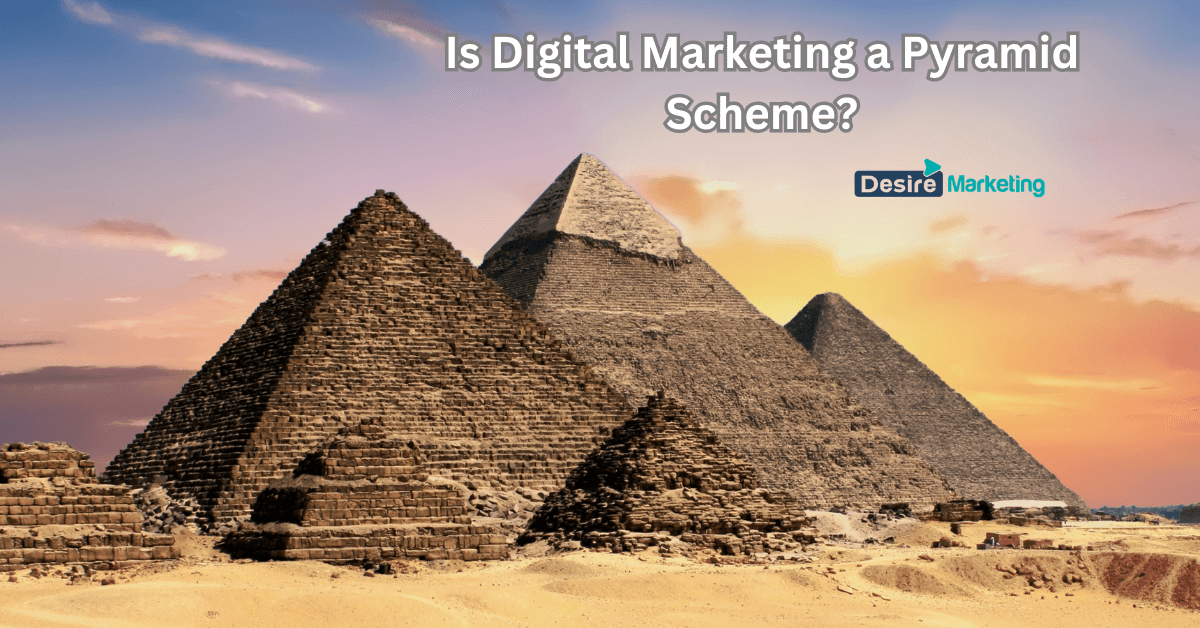Digital marketing is not a pyramid scheme; it is a legitimate, effective strategy for promoting products and services online. In today’s digital age, businesses are continually looking for ways to reach and engage with their target audience.
Digital marketing offers a range of tools and techniques that can help achieve these goals. From search engine optimization (SEO) to social media marketing, email marketing, content marketing, and more, digital marketing encompasses a wide range of tactics that can be tailored to fit any business’s unique needs.
Unlike a pyramid scheme, which relies on recruiting individuals to invest money with the promise of making more money through recruiting others, digital marketing involves promoting products or services in exchange for a fee. It is a legitimate industry that plays a vital role in helping businesses grow and succeed in the online marketplace.

Understanding Pyramid Schemes And Digital Marketing
Digital marketing has taken the business world by storm, revolutionizing the way companies reach their customers. However, amidst the buzz and excitement, some people have raised concerns about whether digital marketing is just another form of a pyramid scheme. In this blog post, we aim to investigate this claim and shed light on the key differences between pyramid schemes and digital marketing.
By understanding both concepts, we can examine any overlapping features and gain a clearer understanding of the matter at hand. So, let’s dive in and explore the defining characteristics of pyramid schemes and the basics of digital marketing.
Debunking The Myth: Digital Marketing As A Pyramid Scheme
Digital marketing has experienced rapid growth in recent years, making it a highly sought-after industry for entrepreneurs and professionals alike. However, one persistent misconception that continues to linger is the idea that digital marketing is nothing more than a pyramid scheme.
In this section, we will examine the fundamental differences between pyramid schemes and digital marketing, explore the legitimate business models within digital marketing, and highlight the role of ethics and regulations in this dynamic field.
Examining The Fundamental Differences Between Pyramid Schemes And Digital Marketing
Digital marketing operates on a completely different model from pyramid schemes. While both may involve referral systems and network building, it is essential to understand the key distinctions between the two:
- Value creation: Unlike pyramid schemes, digital marketing is rooted in value creation. It focuses on promoting products or services that provide genuine value to customers. The success of digital marketing relies on delivering tangible benefits and meeting the needs of consumers, thus establishing a foundation of trust and credibility.
- Income generation: Digital marketing offers various income streams based on performance and results. Individuals engaged in digital marketing, such as affiliate marketers or social media influencers, primarily earn income through commissions or fees for promoting products or services. Their compensation is directly proportional to the value they generate through their marketing efforts.
- Sustainability: Pyramid schemes are unsustainable by nature, as their structure ultimately depends on an infinite flow of new participants entering the scheme. Conversely, digital marketing thrives on creating long-term, sustainable relationships with customers, which requires ongoing efforts to provide value and maintain trust.
Examining The Legitimate Business Models In Digital Marketing
While pyramid schemes lack a legitimate business model, digital marketing encompasses several genuine and ethical approaches to generate income. Here are some of the most common business models within the digital marketing industry:
- Affiliate marketing: Affiliate marketers earn a commission for promoting and driving sales of products or services belonging to other businesses. This model allows for a flexible and scalable income stream without the need for product creation or inventory management.
- E-commerce: In this model, entrepreneurs establish their own online stores to sell products or services directly to customers. They utilize digital marketing strategies to drive traffic, generate leads, and ultimately convert them into paying customers.
- Consulting and freelancing: Professionals with expertise in specific areas of digital marketing, such as SEO, content marketing, or social media management, provide their services on a freelance or consultancy basis. They offer strategic guidance, implementation support, and optimization to help businesses achieve their marketing goals.
Highlighting The Role Of Ethics And Regulations In Digital Marketing
In any industry, ethical practices and adherence to regulations are crucial for maintaining trust and integrity. Digital marketing is no exception. Here’s why ethics and regulations play a vital role in ensuring the sustainability and credibility of digital marketing:
- Transparency: Digital marketers should be transparent in their promotional efforts, clearly disclosing any affiliations, sponsorships, or partnerships that may influence their recommendations or endorsements. This transparency fosters trust between marketers and consumers.
- Compliance: Adhering to legal and regulatory frameworks ensures that digital marketers operate within the boundaries set by authorities. Regulations related to data privacy, advertising, and consumer protection must be followed to prevent unethical practices and protect consumers’ rights.
- Authenticity: Digital marketers should prioritize authentic engagement and genuine content creation. This approach builds credibility and fosters long-lasting relationships with consumers, helping them establish themselves as trusted authorities within their respective niches.
While pyramid schemes and digital marketing may have certain superficial similarities, it is essential to understand that they operate on entirely different principles. Digital marketing relies on value creation, sustainable business models, and adherence to ethics and regulations. By debunking the myth that digital marketing is a pyramid scheme, we can appreciate the opportunities and potential it offers for individuals and businesses alike.
Frequently Asked Questions For Is Digital Marketing A Pyramid Scheme
Is Digital Marketing A Pyramid Scheme?
No, digital marketing is a legitimate and widely used strategy to promote products and services online.
How Does Digital Marketing Work?
Digital marketing involves various techniques such as SEO, social media marketing, content creation, and email marketing to reach and engage with target audiences online.
Can Digital Marketing Guarantee Success?
While digital marketing can greatly increase the chances of success, there is no guarantee as it depends on several factors like strategy, competition, and industry.
Conclusion
Overall, it is clear that digital marketing is not a pyramid scheme, but rather a legitimate and effective way for businesses to reach their target audience. With the increasing reliance on technology and the internet, digital marketing has become an essential tool for companies to grow and succeed in the modern world.
It offers a wide range of strategies and techniques, such as search engine optimization (seo), social media marketing, content marketing, and email marketing, which can be tailored to suit the specific goals and needs of businesses. While there may be some unethical practices in the industry, it is important to remember that these are the exception, not the rule.
By working with reputable and experienced digital marketing professionals, businesses can harness the power of digital marketing to connect with their customers, increase brand awareness, and drive sales. So, rather than being a pyramid scheme, digital marketing is a valuable investment for businesses seeking to thrive in the digital age.





